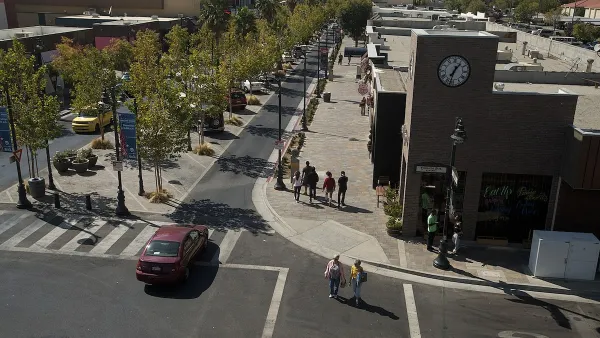Joel Kotkin said today that cities no longer need outside help. The day before, Bill Fulton talked about growth without population growth. This story focuses on strategies for cities to use land plans as business plans.
Hazel Borys writes:
"In the broader sense, urban design and zoning have major impacts on quality of life, attachment, risk, predictability -- major drivers of economic development. This article interviews Bob Gibbs on urban retail downtown and Galina Tachieva on sprawl repair in the 'burbs -- and their wealth-building potential at both ends of the spectrum.
Bob Gibbs encourages us to "look at great cities, when they were peaking in the 40's and 50's, they were simple. Great placemaking, good squares, places between the buildings were beautiful. Even street trees were rare. The older buildings in Winter Park, Florida, or in Palm Beach's Worth Avenue are often 1-story, $60/SF buildings."
"Cities can redevelop themselves by going back to the 20' x 60' lot, and selling them to small entrepreneurs who can build their own. Instead of waiting for someone who can build a $60 million building, the city can replat to the smaller lots, and sell under $50,000 each, then smaller businesses through sweat equity can build their own stores. Rosemary and part of Seaside were built this way. The only part of Rosemary that got in trouble was the large hotel, which went through a few bankruptcy's. It's a very good post-recession model. Instead of taking out a large note and build an Easton Town Center, build the streets and squares."
Thanks to Hazel Borys
FULL STORY: Monkey See, Monkey Don’t: Economic Development as a Whole New Animal

Maui's Vacation Rental Debate Turns Ugly
Verbal attacks, misinformation campaigns and fistfights plague a high-stakes debate to convert thousands of vacation rentals into long-term housing.

Planetizen Federal Action Tracker
A weekly monitor of how Trump’s orders and actions are impacting planners and planning in America.

In Urban Planning, AI Prompting Could be the New Design Thinking
Creativity has long been key to great urban design. What if we see AI as our new creative partner?

King County Supportive Housing Program Offers Hope for Unhoused Residents
The county is taking a ‘Housing First’ approach that prioritizes getting people into housing, then offering wraparound supportive services.

Researchers Use AI to Get Clearer Picture of US Housing
Analysts are using artificial intelligence to supercharge their research by allowing them to comb through data faster. Though these AI tools can be error prone, they save time and housing researchers are optimistic about the future.

Making Shared Micromobility More Inclusive
Cities and shared mobility system operators can do more to include people with disabilities in planning and operations, per a new report.
Urban Design for Planners 1: Software Tools
This six-course series explores essential urban design concepts using open source software and equips planners with the tools they need to participate fully in the urban design process.
Planning for Universal Design
Learn the tools for implementing Universal Design in planning regulations.
planning NEXT
Appalachian Highlands Housing Partners
Mpact (founded as Rail~Volution)
City of Camden Redevelopment Agency
City of Astoria
City of Portland
City of Laramie





























